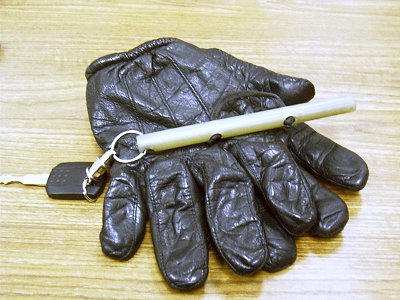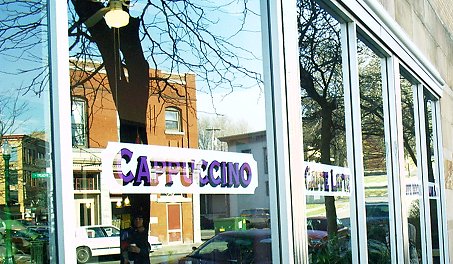 I was standing by my car, which was parked in front of a heavily trafficked coffeehouse in an area near a local University. I was standing outside the car rather than sitting in it because there was an attempted carjacking at that very spot only a week previously. As I do whenever I wait in less than pastoral public places, I passed the time silently thanking the person who handcrafted the polymer koppo keychain that has been my constant companion for some time now.
I was standing by my car, which was parked in front of a heavily trafficked coffeehouse in an area near a local University. I was standing outside the car rather than sitting in it because there was an attempted carjacking at that very spot only a week previously. As I do whenever I wait in less than pastoral public places, I passed the time silently thanking the person who handcrafted the polymer koppo keychain that has been my constant companion for some time now.
With the koppo’s strap threaded across my middle and ring fingers, I watched the college students and basketball game spectators bustling past. Crowds were heavy in the wake of the recently completed exhibition featuring the Harlem Globetrotters. Parking spaces were sparse and I was grateful to have snagged a prime section of curb. There was plenty of people watching to do; the location hosts a cross-section of urban society, including all races, income levels, and occupations.
 My polymer koppo and the unlined “Police” gloves I favor.
My polymer koppo and the unlined “Police” gloves I favor.
One trend developing at that particular location is most unwelcome and quite sobering: an increasing street person presence. The beggars I noticed most recently were sexually harassing female pedestrians. “Hey, gorgeous, you got any spare change?” was the mantra. “Hey, baby. Hey! Baby!”
At The Martialist I’ve written more than one editorial about the dangers of the homeless, of street people, of panhandlers – terms I use interchangeably. These editorials have outraged various bleeding hearts and virtual tough guys, who’ve called my opinions on the matter everything from paranoid and unrealistic to schizophrenic and full of hate.
With rare exceptions, none of these people have any experience with the homeless. A few of them wrongly extrapolate, from their own fortunately peaceful encounters, a distorted and utopian view of reality in which street beggars are merely kind-hearted, down-on-their-luck characters with hearts of gold. Worse than these are the people who’ve actually had encounters with violent street people who blame “the system” and see socialist transfers of wealth as the solution to these societal problems.
Anyone capable of holding these views had not walked the gauntlet endured by countless urban pedestrians every day. Men and women who actually contribute to society, who in many cases are walking to jobs they’d rather not work for less pay than they deserve, must suffer further by dodging the grasping claws and barked demands of harassing, unstable, persistent panhandlers.

Why does this topic make me so angry? I am, after all, a lone, armed white man more than capable of fending off a single panhandler. I am not angry for myself, though. I am angry for every woman who has ever felt disgusted and fearful listening to the catcalls and feeling the gaze of a stinking, too-close beggar looming in her path. I am angry for every peaceful man who has had to wonder if he must use his fists simply to walk through a parking lot or down the street. I am angry for every person who is walking with his or her children, who has a physical disability, or who just doesn’t wish to be yelled at by strangers who want what they have not earned.
No one has the right to accost you.
That’s a fact. No “right to beg” exists. No one has license to invade the personal space of others or to make unwanted demands of them.
The problem of street people, however, is that the majority of them have mental problems or chemical abuse issues – problems that make them unpredictable and prone to violence. Yes, all people you encounter, no matter what their stations in life, could be threats – but you’d be a fool not to recognize the heightened risks offered by those who are obviously ill-kempt and erratic.
All these thoughts went through my mind as I watched outside that coffeehouse. While I waited, a disheveled, gaunt African-American man in his twenties or thirties came shuffling up, rattling the loose change in a paper cup. “Change?” he barked. “Any change?” He accosted several people, all of whom ignored him. He asked me for change too. I stared him down and he wandered a little farther away.
Had I left then, those of you who think street people are just misunderstood would be free to chastise me as callous and paranoid. There’s more to this particular story, though.
When no one among the plentiful crowd would give this person any money, he became hostile and belligerent. “What the fuck…” he muttered, his voice growing louder as he worked up a head of steam. “I ain’t so fuckin’ bad… fuckin’ assholes… sons of bitches…”
Now, is he a harmless hobo whom society has left behind? Is it just possible that when approached by a shaking, angry, reeking man – who is yelling obscenities and cursing you out for refusing him money – you’ll recognize him for the threat he represents?
Compassion is a wonderful thing Misplaced compassion will get you maimed or killed. No amount of compassion will change the harsh realities of street predation. Remember that the next time you’re out.
If I needed a reminder, I certainly got one.